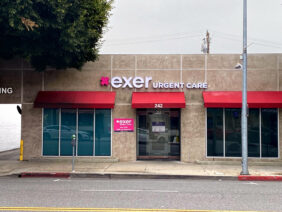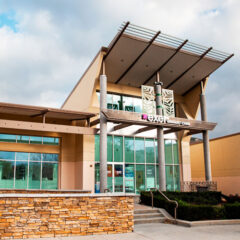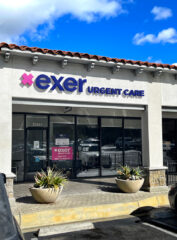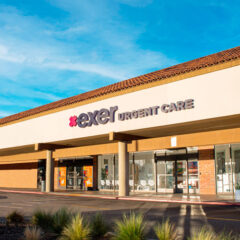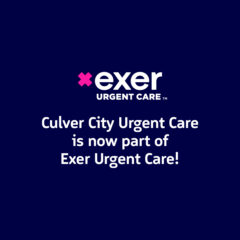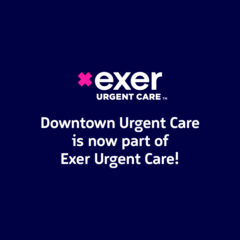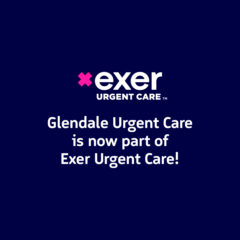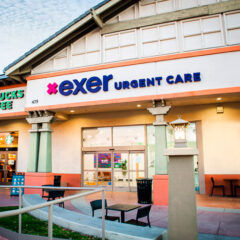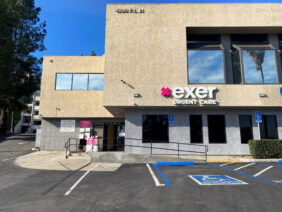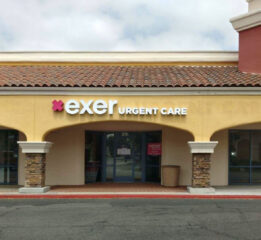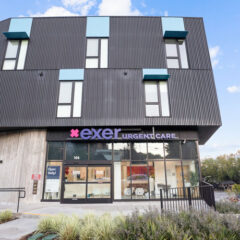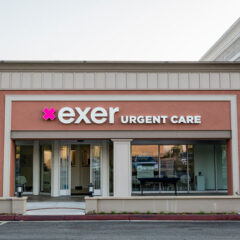Life is unpredictable. Minor ailments or injuries can trouble us when we least expect them, often at the most inconvenient times. You may have experienced this scenario before: It’s late in the evening, your primary care doctor’s office is closed, and you have come down with a sudden, severe bout of flu-like symptoms. Or perhaps you have suffered a sprain or minor fracture during a weekend game.
When this happens, your first thought might be to rush to your nearest emergency room. Based on this, ER visits usually mean long waits and hefty medical bills, especially for conditions that are not life-threatening.
That’s where urgent care and walk-in clinics like Exer Urgent Care come in. Designed to fill the gap between traditional doctors’ offices and hospital emergency rooms, our centers provide prompt, efficient, and affordable medical care for non-emergency situations. You can walk in without an appointment, receive treatment for a range of non-life-threatening conditions, and walk out within a short time.
Common Conditions Treated at Exer Urgent Care Clinics
If you are feeling unwell or have had a minor accident, and it’s not severe enough to warrant a trip to the ER – that’s when you can go to an Exer Urgent Care clinic. You don’t even have to wait for a scheduled appointment like you do with your primary care physician.
Exer is also called a “walk-in clinic” because you can just walk in any time, be seen by a qualified healthcare professional, and receive the necessary treatment quickly. You can get the medical services you need right when you need it, which is especially handy after hours, on weekends, or when your regular physician’s office is closed.
Our Exer Urgent Care centers are equipped to handle a wide range of health issues including minor injuries like sprains, cuts, and fractures, common illnesses like colds, flu, and stomach bugs, and chronic condition management. They also often offer additional services like vaccinations, physical exams, and diagnostic tests such as x-rays or laboratory testing.
But remember, urgent care facilities are not a substitute for medical emergency care. Conditions like severe chest pain, heart attacks, strokes, severe bleeding, or other life-threatening conditions still require a visit to the emergency room.
Let’s discuss some of the most common health issues you can get treated at an Exer Urgent Care clinic.
Minor Injuries
“Minor injuries” is a broad term used to describe any physical harm that is not life-threatening and does not require complex medical intervention or hospitalization, such as:
Cuts and abrasions: These are surface wounds that break the skin. Cuts are caused by sharp objects and can sometimes reach deeper layers of skin, while abrasions are usually caused by scraping against a rough surface and involve damage to the topmost layer of skin.
Bruises: These occur when the small blood vessels, or capillaries, near the skin’s surface are ruptured due to impact from a fall, bump, or hit. This causes blood to leak into the surrounding tissue and create a dark, discolored patch on the skin.
Sprains: A sprain happens when the ligaments – the tough bands of tissue connecting two bones – are overstretched or torn. This is commonly experienced in the ankles, knees, or wrists, due to a fall or twist.
Strains: These occur when a muscle or tendon (the fibrous cords of tissue that connect muscles to bones) is overstretched or torn. Strains generally occur in the back or hamstring, and can be caused by heavy lifting, or abrupt twisting and turning movements.
Minor fractures: These are small, hairline breaks in a bone. While they are considered serious injuries, they are not really life-threatening and can be managed at an urgent care facility.
Minor burns: First-degree and some second-degree burns, which affect only the outer layers of skin, are also considered minor injuries. They can be caused by exposure to heat, electricity, chemicals, or radiation.
These injuries are not considered life-threatening, but they should still be treated immediately to prevent complications, relieve discomfort, and speed up recovery.
At Exer Urgent Care, our medical professionals are trained to quickly assess your injury through a physical examination and, if needed, diagnostic tests like X-rays. Depending on the type and severity of the injury, treatment may involve cleaning and bandaging wounds, immobilizing affected areas with splints or casts, prescribing pain relief medication, and in some cases, arranging for further care or follow-up.
Respiratory Infections
Any sort of infection that affects your respiratory system (the parts of your body involved in breathing) can be classified as a respiratory infection. These include the nasal passages, throat (pharynx), voice box (larynx), windpipe (trachea), bronchi, and lungs. You probably are already familiar with these infections:
Common cold: This is a mild illness caused by a variety of viruses that can result in a runny or stuffy nose, sore throat, cough, mild headache, and sometimes a low-grade fever.
Influenza (Flu): The flu is more severe than the common cold and is caused by specific influenza viruses. Symptoms include fever, body aches, extreme fatigue, and dry cough. Without treatment, some types of flu can become severe.
Bronchitis: This is an infection of the bronchial tubes, i.e., the large passages that carry air to the lungs. Symptoms include a persistent cough, often with mucus, chest discomfort, shortness of breath, and sometimes fever.
Pneumonia: This is a serious infection that inflames the air sacs in one or both of your lungs. These air sacs may fill with fluid or pus, and cause symptoms like cough with phlegm, fever, chills, and difficulty breathing.
If you are experiencing any of these symptoms, especially if they are severe or persist for more than a few days, a visit to Exer can help. Our medical care providers can diagnose your condition based on your symptoms, medical history, and possibly further testing like a throat swab or chest x-ray. Treatment will depend on the type of infection and may include antiviral medication for the flu, antibiotics for bacterial infections like pneumonia, and advice on rest, hydration, and over-the-counter remedies for immediate relief.
Skin Conditions
Your skin is your body’s largest organ and as such, is prone to minor issues as well as chronic conditions. These can manifest as symptoms like itching, redness, swelling, pain, or changes in skin color or texture. If you’re experiencing any of the following problems with your skin, an urgent care clinic can help:
Rashes: A rash is a noticeable change in the texture or color of your skin. Your skin may become scaly, bumpy, itchy, or otherwise irritated. Rashes can be caused by many things, such as certain diseases, allergic reactions, or an infection.
Allergic reactions: These occur when your immune system reacts to a substance (allergen) it considers harmful, even though it may not be. These allergens could be pollen, dust mites, pet dander, among others, and can cause skin reactions like hives or dermatitis.
Minor burns: These are superficial burns that only affect the skin’s outer layer. They can cause pain, redness, and swelling but generally heal in about a week with appropriate care.
Insect bites: Bites from insects can cause itchy, red bumps or even severe allergic reactions in some people.
Skin infections: These can be caused by a variety of organisms, including bacteria (such as in cellulitis or impetigo), viruses (like cold sores or shingles), fungi (as in athlete’s foot or ringworm), or parasites (like scabies).
Exer can help diagnose and treat almost all of these skin conditions – of course, as long as they are not deemed life-threatening. We can visually inspect the affected area, ask about your symptoms and possible triggers, and if necessary, perform tests like skin swabs. Treatment may include creams or ointments for inflammation and itch relief, antibiotics for infections, or guidance on how to care for the condition at home and when to seek further care.
Gastrointestinal Problems
These are the conditions that impact your digestive system – this includes organs like your esophagus, stomach, small intestine, large intestine (colon), rectum, liver, gallbladder, and pancreas. The following health problems fall into this category:
Stomach bugs/gastroenteritis: This is inflammation of the stomach and intestines, which can result from a virus, bacteria, or parasite. If you’re experiencing symptoms like nausea, vomiting, diarrhea, abdominal cramping, or fever, it might be a stomach bug.
Food poisoning: This happens when you eat food contaminated with bacteria, viruses, or other toxins. Symptoms can start within hours of consuming the food and can include nausea, vomiting, watery diarrhea, abdominal pain, and fever.
Gastroesophageal reflux disease (GERD): This chronic condition occurs when stomach acid frequently flows back into the tube connecting your mouth and stomach (esophagus). This backwash (acid reflux) can irritate the lining of your esophagus and cause heartburn, chest pain, difficulty swallowing, regurgitation of food or sour liquid, and feeling of a lump in your throat.
Peptic ulcers: These are open sores that develop on the inside lining of your stomach, upper small intestine, or esophagus. They often cause burning stomach pain that might worsen when your stomach is empty, bloating, heartburn, nausea, or in severe cases, vomiting or vomiting blood.
Gallstones: These are hardened deposits in the gallbladder, which is a small organ under the liver. While gallstones may not always cause symptoms, they can block your bile ducts and cause sudden pain that rapidly intensifies in the upper right portion of your stomach, the center of your stomach, or just below your right shoulder, along with back pain between your shoulder blades, or pain in your right shoulder.
When you are dealing with symptoms like nausea, vomiting, diarrhea, abdominal pain, or other discomforts that are affecting your quality of life, you can get immediate care at urgent care services.
At Exr Urgent Care, our doctors can perform diagnostic tests like blood tests, imaging tests or even stool analysis to understand the root cause of your symptoms. Based on the results, we can treat you with medications to alleviate symptoms and antibiotics for bacterial infections. For more serious conditions, we may refer you for further tests or specialist care.
Urinary Tract Infections (UTIs)
Urinary tract infections can affect any part of your urinary system: your kidneys, bladder, ureters, or urethra. They are particularly common among women but can be effectively treated by our staff at Exer Urgent Care.
The symptoms of a UTI can vary depending on which part of your urinary tract is infected. Some common symptoms may include:
- Burning sensation while urinating
- A persistent urge to urinate
- Passing frequent, small amounts of urine
- Strong-smelling urine
- Urine that appears cloudy
- Urine that appears red, bright pink, or cola-colored — a sign of blood in the urine
- Pelvic pain, especially in women, in the center of the pelvis and around the pubic bone
If you suspect you have a UTI, head over to a walk-in clinic to get it diagnosed and treated quickly. Remember, if this infection reaches your kidneys, it can cause more serious problems, in which case you’ll need to go to the emergency room.
Exer Urgent Care can swiftly diagnose UTIs through a simple urine test and prescribe antibiotics to clear the infection. As long as you take the entire course of medication as prescribed, even if you start feeling better, the infection will be fully eradicated. We will also provide advice on how to prevent future UTIs and when to seek further care.
Need Medical Attention Right Away for a Minor Ailment or Injury? Walk Into Your Nearest Exer clinic Today
Your healthcare concerns don’t follow a 9-to-5 schedule, and not all ailments need an expensive trip to the hospital emergency room – which is why Exer Urgent Care provides timely medical care without the need for an appointment.
We treat a multitude of conditions including, but not limited to:
- Minor cuts and wounds
- Sprains and strains
- Minor fractures or broken bones (not severe or compound fractures)
- Infections (e.g., urinary tract infections, respiratory infections)
- Cold and flu symptoms
- Allergies and allergic reactions
- Rashes and skin irritations
- Minor burns
- Ear and sinus infections
- Sore throat and strep throat
- Minor asthma attacks
- Eye infections or pink eye
- Minor gastrointestinal issues (e.g., diarrhea, vomiting, mild food poisoning)
- Back pain or minor back injuries
- Minor headaches or migraines
Our urgent care centers are open daily with extended hours. You no longer have to wait days or weeks to get an appointment with a primary care doctor – just walk in whenever you, your child, or your elderly loved one needs care.
In addition to treating minor illnesses, we also provide medically necessary services like diagnostic tests, lab services, minor surgeries, medications, therapies, and preventive screenings.
Don’t wait until it’s an emergency. Visit us at the first sign of an issue and let our team take care of you. Find an Exer Urgent Care clinic near you today.




